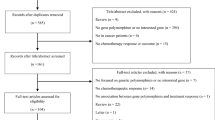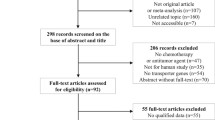Abstract
The transmembrane transport of anticancer drugs is mainly regulated by P-glycoprotein encoded by the human multidrug resistance gene 1 gene (MDR1). Since there were controversies regarding the association between MDR1 C3435T polymorphism and response to chemotherapy among patients with advanced breast cancer, a meta-analysis of the link was conducted. A total of 7 studies consist of 464 advanced breast cancer patients relating MDR1 C3435T polymorphism to the response of chemotherapy were included in this meta-analysis. The main analysis revealed a lack of association between the MDR1 C3435T and response to chemotherapy, with odds ratios (ORs) and their corresponding 95% confidence intervals (CIs) of 1.37 (95% CI: 0.78–2.40), 1.17 (95% CI: 0.69–2.01), 1.18 (95% CI: 0.76–1.84) and 1.61 (95% CI: 0.70–3.68) for homozygous comparison, heterozygous comparison, dominant model and recessive model, respectively. The subgroup analysis by ethnicity did not change the pattern of results, with ORs of 0.99 (95% CI: 0.11–9.07), 0.68 (95% CI: 0.29–1.60), 0.81 (95% CI: 0.36–1.85) and 1.51 (95% CI: 0.77–2.96), in homozygous comparison, heterozygous comparison, dominant model and recessive model, respectively in Caucasian, and 1.50 (95% CI: 0.75–3.03), 1.72 (95% CI: 0.85–3.47), 1.59 (95% CI: 0.90–2.80) and 2.29 (95% CI: 0.51–10.35), respectively in Asian. The available evidence indicates that MDR1 C3435T polymorphism cannot be considered as a reliable predictor of response to chemotherapy in patients with advanced breast cancer.



Similar content being viewed by others
References
Ferlay J, Shin HR, Bray F et al (2010) Estimates of worldwide burden of cancer in 2008: GLOBOCAN 2008. Int J Cancer 127:2893–2917
Jemal A, Siegel R, Ward E et al (2008) Cancer statistics, 2008. CA Cancer J Clin 58:71–96
Fan L, Zheng Y, Yu KD et al (2009) Breast cancer in a transitional society over 18 years: trends and present status in Shanghai, China. Breast Cancer Res Treat 117:409–416
Gor PP, Su HI, Gray RJ et al (2010) Cyclophosphamide-metabolizing enzyme polymorphisms and survival outcomes after adjuvant chemotherapy for node-positive breast cancer: a retrospective cohort study. Breast Cancer Res 12:R26
Breier A, Barancik M, Sulova Z et al (2005) P-glycoprotein—implications of metabolism of neoplastic cells and cancer therapy. Curr Cancer Drug Targets 5:457–468
Gottesman MM, Fojo T, Bates SE (2002) Multidrug resistance in cancer: role of ATP-dependent transporters. Nat Rev Cancer 2:48–58
Soto-Vega E, Arroyo C, Richaud-Patin Y et al (2009) P-glycoprotein activity in renal clear cell carcinoma. Urol Oncol 27:363–366
Vlachogeorgos GS, Manali ED, Blana E et al (2008) Placental isoform glutathione S-transferase and P-glycoprotein expression in advanced nonsmall cell lung cancer: association with response to treatment and survival. Cancer 114:519–526
Gouaze V, Yu JY, Bleicher RJ et al (2004) Overexpression of glucosylceramide synthase and P-glycoprotein in cancer cells selected for resistance to natural product chemotherapy. Mol Cancer Ther 3:633–639
Burger H, Foekens JA, Look MP et al (2003) RNA expression of breast cancer resistance protein, lung resistance-related protein, multidrug resistance-associated proteins 1 and 2, and multidrug resistance gene 1 in breast cancer: correlation with chemotherapeutic response. Clin Cancer Res 9:827–836
Mutoh K, Tsukahara S, Mitsuhashi J et al (2006) Estrogen-mediated post transcriptional down-regulation of P-glycoprotein in MDR1-transduced human breast cancer cells. Cancer Sci 97:1198–1204
Hoffmeyer S, Burk O, von Richter O et al (2000) Functional polymorphisms of the human multidrug-resistance gene: multiple sequence variations and correlation of one allele with P-glycoprotein expression and activity in vivo. Proc Natl Acad Sci USA 97:3473–3478
Nauck M, Stein U, von Karger S et al (2000) Rapid detection of the C3435T polymorphism of multidrug resistance gene 1 using fluorogenic hybridization probes. Clin Chem 46:1995–1997
Tahara T, Arisawa T, Shibata T et al (2007) Multi-drug resistance 1 polymorphism is associated with reduced risk of gastric cancer in the Japanese population. J Gastroenterol Hepatol 22:1678–1682
Maffioli M, Camos M, Gaya A et al (2010) Correlation between genetic polymorphisms of the hOCT1 and MDR1 genes and the response to imatinib in patients newly diagnosed with chronic-phase chronic myeloid leukemia. Leuk Res 35:1014–1019
Ni LN, Li JY, Miao KR et al (2011) Multidrug resistance gene (MDR1) polymorphisms correlate with imatinib response in chronic myeloid leukemia. Med Oncol 28:265–269
Kafka A, Sauer G, Jaeger C et al (2003) Polymorphism C3435T of the MDR-1 gene predicts response to preoperative chemotherapy in locally advanced breast cancer. Int J Oncol 22:1117–1121
Ashariati A (2008) Polymorphism C3435T of the MDR-1 gene predict response to preoperative chemotherapy in locally advanced breast cancer with Her2/neu expression. Acta Med Indones 40:187–191
Cizmarikova M, Wagnerova M, Schonova L et al (2010) MDR1 (C3435T) polymorphism: relation to the risk of breast cancer and therapeutic outcome. Pharmacogenomics J 10:62–69
Zhang BL, Sun T, Zhang BN et al (2011) Polymorphisms of GSTP1 is associated with differences of chemotherapy response and toxicity in breast cancer. Chin Med J (Engl) 124:199–204
Cochran W (1954) The combination of estimates from different experiments. Biometrics 10:101–129
DerSimonian R, Laird N (1986) Meta-analysis in clinical trials. Control Clin Trials 7:177–188
Higgins JP, Thompson SG (2002) Quantifying heterogeneity in a meta-analysis. Stat Med 21:1539–1558
Mantel N, Haenszel W (1959) Statistical aspects of the analysis of data from retrospective studies of disease. J Natl Cancer Inst 22:719–748
Egger M, Davey Smith G, Schneider M et al (1997) Bias in meta-analysis detected by a simple, graphical test. BMJ 315:629–634
George J, Dharanipragada K, Krishnamachari S et al (2009) A single-nucleotide polymorphism in the MDR1 gene as a predictor of response to neoadjuvant chemotherapy in breast cancer. Clin Breast Cancer 9:161–165
George J, Dharanipragada K, Krishnamachari S et al (2009) Association of the ABCB1 gene polymorphisms 2677G>T/A and 3435C>T with clinical outcomes of paclitaxel monotherapy in metastatic breast cancer patients. Ann Oncol 20:272–277
Rodrigues FF, Santos RE, Melo MB et al (2008) Correlation of polymorphism C3435T of the MDR-1 gene and the response of primary chemotherapy in women with locally advanced breast cancer. Genet Mol Res 7:177–183
Zintzaras E, Ziogas DC, Kitsios GD et al (2009) MTHFR gene polymorphisms and response to chemotherapy in colorectal cancer: a meta-analysis. Pharmacogenomics 10:1285–1294
Verrelle P, Meissonnier F, Fonck Y et al (1991) Clinical relevance of immunohistochemical detection of multidrug resistance P-glycoprotein in breast carcinoma. J Natl Cancer Inst 83:111–116
Leonessa F, Clarke R (2003) ATP binding cassette transporters and drug resistance in breast cancer. Endocr Relat Cancer 10:43–73
Chevillard S, Lebeau J, Pouillart P et al (1997) Biological and clinical significance of concurrent p53 gene alterations, MDR1 gene expression, and S-phase fraction analyses in breast cancer patients treated with primary chemotherapy or radiotherapy. Clin Cancer Res 3:2471–2478
Tanabe M, Ieiri I, Nagata N et al (2001) Expression of P-glycoprotein in human placenta: relation to genetic polymorphism of the multidrug resistance (MDR)-1 gene. J Pharmacol Exp Ther 297:1137–1143
Levine MN, Whelan T (2006) Adjuvant chemotherapy for breast cancer—30 years later. N Engl J Med 355:1920–1922
Merk J, Rolff J, Dorn C et al (2011) Chemoresistance in non-small-cell lung cancer: can multidrug resistance markers predict the response of xenograft lung cancer models to chemotherapy? Eur J Cardiothorac Surg 40:e29–e33
Moureau-Zabotto L, Ricci S, Lefranc JP et al (2006) Prognostic impact of multidrug resistance gene expression on the management of breast cancer in the context of adjuvant therapy based on a series of 171 patients. Br J Cancer 94:473–480
Schwab M, Eichelbaum M, Fromm MF (2003) Genetic polymorphisms of the human MDR1 drug transporter. Annu Rev Pharmacol Toxicol 43:285–307
Illmer T, Schuler US, Thiede C et al (2002) MDR1 gene polymorphisms affect therapy outcome in acute myeloid leukemia patients. Cancer Res 62:4955–4962
Sohn JW, Lee SY, Lee SJ et al (2006) MDR1 polymorphisms predict the response to etoposide-cisplatin combination chemotherapy in small cell lung cancer. Jpn J Clin Oncol 36:137–141
Isla D, Sarries C, Rosell R et al (2004) Single nucleotide polymorphisms and outcome in docetaxel-cisplatin-treated advanced non-small-cell lung cancer. Ann Oncol 15:1194–1203
Jiko M, Yano I, Sato E et al (2007) Pharmacokinetics and pharmacodynamics of paclitaxel with carboplatin or gemcitabine, and effects of CYP3A5 and MDR1 polymorphisms in patients with urogenital cancers. Int J Clin Oncol 12:284–290
Conflict of interest
There is no conflict of interests.
Author information
Authors and Affiliations
Corresponding authors
Electronic supplementary material
Below is the link to the electronic supplementary material.
Rights and permissions
About this article
Cite this article
Chen, G., Quan, S., Hu, Q. et al. Lack of association between MDR1 C3435T polymorphism and chemotherapy response in advanced breast cancer patients: evidence from current studies. Mol Biol Rep 39, 5161–5168 (2012). https://doi.org/10.1007/s11033-011-1312-2
Received:
Accepted:
Published:
Issue Date:
DOI: https://doi.org/10.1007/s11033-011-1312-2




